They say that long, cold dark nights can have an effect on people - but if you ask us, there must be something in the water in Finland too, as the games coming out of Helsinki-ish based Remedy keep getting weirder and weirder. While Alan Wake was strange enough, with its magic book that makes fiction reality, a lake that's apparently ocean, and most disturbingly of all, a fat publicist who wraps himself in fairy lights, Control has enough paranormal creepiness to send you running for your tinfoil hat, with a plot that seems to take in every conspiracy theorist's wildest dreams.
Seemingly set in the same "universe" as Alan Wake, Control is a third-person adventure that takes place in the Federal Bureau of Control - a shady government organisation that's essentially dedicated to covering up paranormal events. Though the idea of a floppy disk that can use telekinesis to lob computing hardware your way, or a light-switch that causes people to disappear (by transporting them to another dimension) might seem far-fetched, the FBC takes reports of urban legends like these very seriously, as often they lead to an "Object of Power" - an ordinary household item that's somehow gained mysterious abilities through forces we don't yet understand. As the damage racks up, and more people fall victim to the items' powers, the FBC are there to step in, clear things up, and do their best to convince people to look the other way, stopping the general public from learning the truth about the inter-dimensional weirdness that's out there. Even the agency itself is top secret, taking up a building known only as the Oldest House - which, through some paranormal mystery or another, has always been there, yet has never been found by the general public.
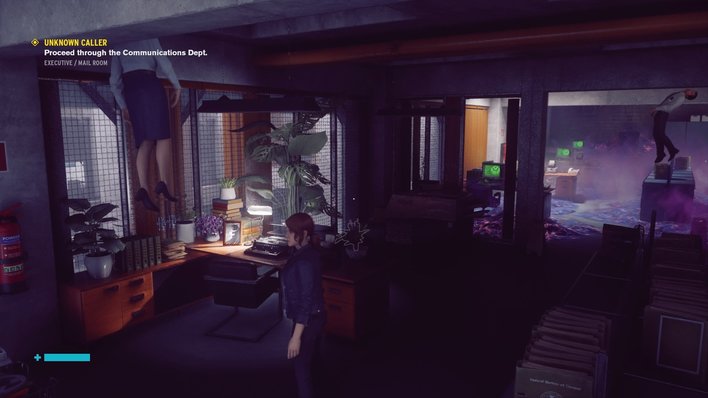
Yeah, something's not quite right here
Into this nest of weirdness comes Jesse - a woman being guided by a voice inside her head - who stumbles into the Bureau of Control at the worst possible time. Turns out spending your days hoarding all sorts of paranormal objects for "experiments" isn't the safest of things to be doing, as the cover-up bods at the bureau have tampered with one haunted toaster too many, only to find themselves under attack from the inside by a mysterious entity known as "the Hiss". The Hiss isn't really a race or anything specific so much as a "thing" - what the game calls a "resonance" - which has possessed almost every FBC agent in the building - and is now taking great pleasure in turning them against you. In essence, you're entering into a building that's full of creepy paranormal artefacts with a mind of their own - and an entity that's hell bent on using them against you.
But Jesse hasn't just come to sight-see - in fact, she's a little bit paranormal herself. When she was young, Jesse was involved first-hand in an AWE (which the acronym fans amongst you will no doubt know stands for All Wrestling Elite Altered World Event - essentially a substantial paranormal happening) in a town called Ordinary, where things got a little bit out of hand. When the FBC swooped in to clean things up, they took her brother with them - and ever since, she's sworn she's going to try and get him back.
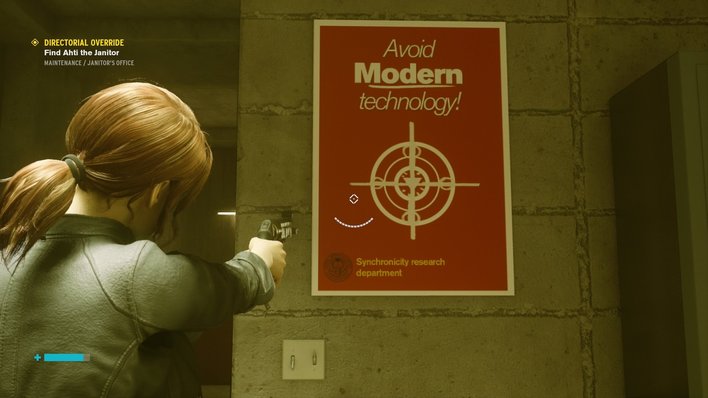
Essentially my dad's approach to life.
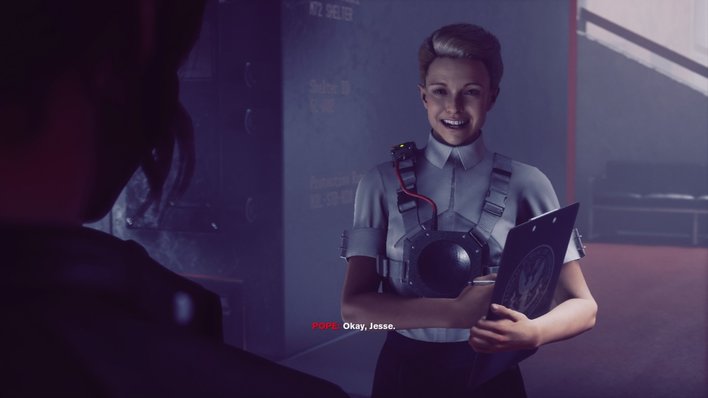
Despite how she looks, Emily here actually hasn't been possessed by the hiss. We still can't quite decide if she's smiling or thinking about eating us, though.
OK, so that's a lot of story exposition - but with all that said and done, you may be surprised to learn that the story isn't really all that strong in Control for the first half-or-so of the game. Instead, this is a game that's initially all about your cool psycho-powers, and the things you can do with them. For one reason or another, Jesse finds herself in the unique position of being able to "bind" with the paranormal artefacts she find, letting her gain their powers. So that 8-inch floppy disk the bureau stole from the Russians? You can pinch its ability to launch things telekinetically across the room. How about a horse from a carousel that knows how to teleport? Same deal - find it, bind with it, and you can "cleanse" it, stealing its powers. While there's only a handful of items to find - there's no Pokemon style gotta catch 'em all thing going on here - what it means in practice is that the combat is really, really fun.
In essence, Control is a physics playground. Anything and everything can be lifted, tossed around, smashed or shattered if it gets in your way. Wood splinters, walls fracture, desks and office chairs career around, and it only takes a few moments for a neatly laid out office to turn into a complete and utter mess.
Your main power here is called "launch", which lets you grab any object that isn't nailed down, and lob it at an enemy at breakneck speed. Even better is when upgraded, you can lift the enemies themselves, and pelt them with each other. Sometimes grabbing an item from behind an enemy lets you smack him in the back of the head as you pull it towards you, before taking out his friend as you throw it away. Add in the ability to pull up a makeshift forcefield of rubble should the going get too tough, a gun that has unlimited ammo (albeit which has to recharge) and an old mind trick that lets you turn a weakened enemy against his friends, and you've got a game that makes you feel more like a jedi than any Star Wars game has in the last decade. A completely reactive world, you can have plenty of fun here just by lobbing things around and watching as a Rube Goldberg machine of pigeon holes, monitors and stationery come crashing down. Even if it does sometimes go slightly wrong...
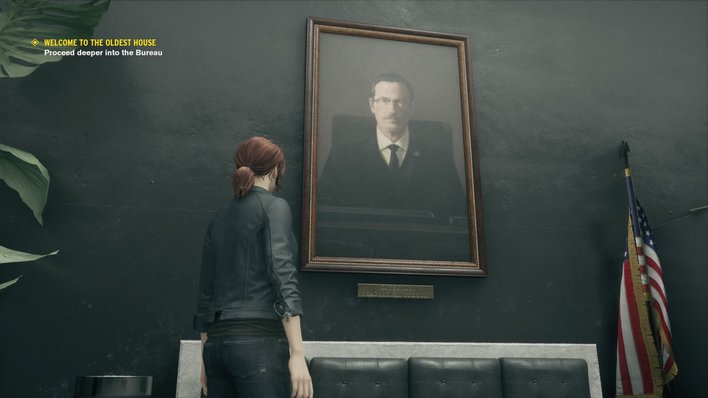
"When I first started Reynholm Industries, I had just two things in my possession: a simple dream, and six million pounds."
And it's a good job the combat's fun, because Control doesn't half like throwing it at you. With the entire game taking place within the same building, the Oldest House has been built like a maze, with access cards locking off certain areas, Resident Evil-style. With objectives often asking you to go from one end of the sprawling lab to the other, it's lucky you can fast travel between areas - but even then, it's nigh on impossible to move from one room to another without dozens and dozens of enemies teleporting in to areas you've already cleared. Were the combat not so enjoyable, it'd get old a lot quicker than it does - but as it stands, it just, just about manages to stay on the right side of being annoying.
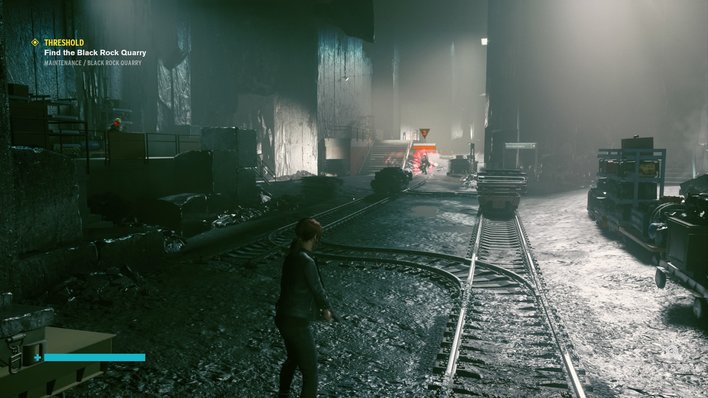
No matter where you go, there's no escaping the hiss.
Though the story itself may take a while to get going, though, there are still plenty of scene-setting extras you can find that help shine a light on life inside the bureau. From reports about encounters with "Objects of Power", to fact files about other Altered World Events, along with passive-aggressive notes left from one worker to another, the files you find scattered about the place do a great job of building up an atmosphere of mystery, and slowly help you piece together just what it was that happened in Ordinary. Similarly, the informational videos that play around the place, featuring live actors and recorded by chief scientist Dr. Darling (who, mysteriously enough, is played by the same guy who played Alan Wake in, er, Alan Wake), are a really nice touch, and one that helps bring the world to life.
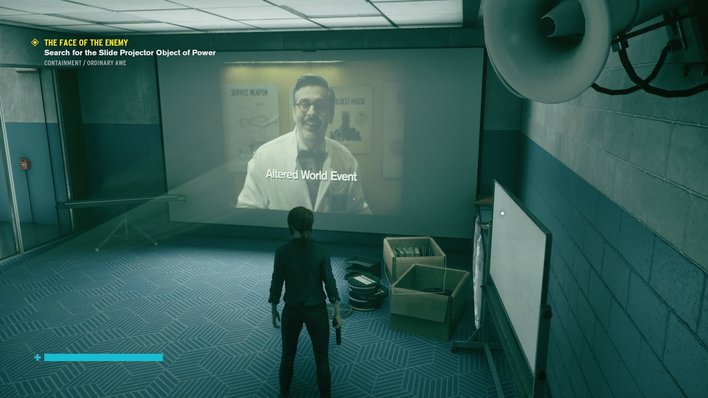
Oh, so that's what it stands for!
In traditional Remedy style, there's also a mock kids-TV show, called the Threshold Kids, that can be found playing on certain monitors throughout the bureau. Essentially a low-budget puppet show designed to help kids who live in the Oldest House get used to the unique issues that come with living on the threshold of two dimensions, it's certainly a weird watch. If an object appears where you don't remember seeing one before, don't touch it!
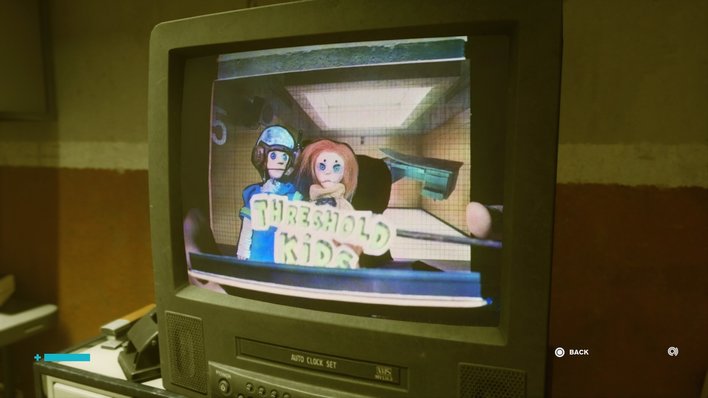
It's not creepy at all...
But as is often the way with Remedy games, it's the musical partnerships that provide some of the best moments in the game. For the most part, Control is actually disappointingly lacking on the soundtrack front, with next to nothing by way of an orchestral score to provide a backing to the action - but there is one section that changes all that. For Control, Remedy have once again teamed up with awesome Finnish rock band Poets of the Fall, who take on their personas from Alan Wake as the Old Gods of Asgard for one of the game's finest moments. (Sound on!)
Making your way through a morphing hotel maze, which twists and turns like a fun house, with walls melting away and springing up as you pass, you'll find your way through thanks to the band's new track, Take Control, which blares in the background, and actually changes to fit what's happening, with sections seamlessly altering, repeating, or lengthening depending on the action. It's not the first type a game's featured a dynamic soundtrack by any means, but when the music matches the action so well, everything really comes together.
With so many nice touches, then, it's all the more disappointing that there are a few too many rookie mistakes here - the sort of stuff that seems blindingly obvious, yet somehow seems to have flown beneath the radar at Remedy. I mean, think about it. Here's a game where almost all of its areas are split across multiple floors - sometimes five or more. As you'd probably expect, finding your way around is an incredibly important part of the game. So what's the one thing it was most important for Remedy to get right? The map. And what do you think the one thing they've botched more than anything is?

Bingo
Incredibly, rather than try and give you a proper, authentic view of how the building's structured, the map here tries to fit five storeys worth of rooms into one layer. And it works about as well as you'd expect. What you're left with is a map that tries to distill too much information into a single layer, making it literally impossible to tell which room connects to where. With enemies spawning in in almost every other room as you're trying to find your way around, getting lost very quickly gets very irritating indeed - and it happens far more often than it should, thanks to the awful map. (As an aside, we're also miffed it doesn't tell you what rooms you've visited, and which are still locked - it'd make it a lot easier to find the collectibles.)
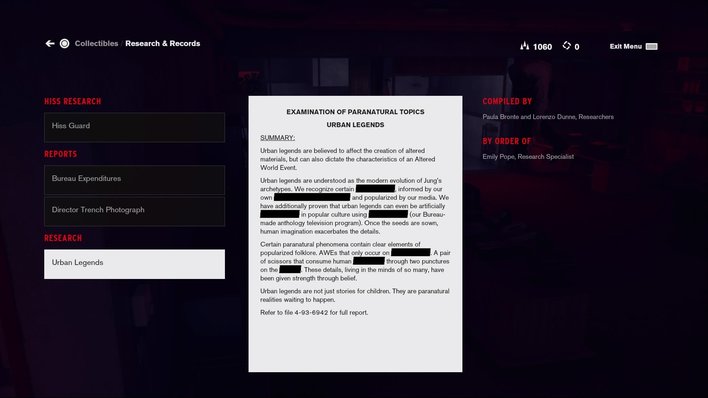
There are loads of collectibles to find, which fill you in on the game's backstories - but you're going to miss loads thanks to the crappy map.
Weirdly, that's not the only rookie mistake Remedy make here. While heavily story driven games are usually a great way of hooking a wide audience, including those who may not play games all that often, there's actually nothing in the way of an adjustable difficulty here. Instead, Control just has the one difficulty level that everyone plays on - and if you don't like it, you're stuffed. With more and more games introducing "narrative" style modes, for players who perhaps aren't as good at dual analogue controls (and with a camera that doesn't even try and stay behind your character, Control is about as challenging controls-wise as a game like this can get), it seems out of step for Remedy to basically force everyone down the same path - especially when there are as many difficulty spikes as there are here. Even dafter is the fact you can upgrade your skills, weapons and character - but the game doesn't actually bother to mention it. Unless you go looking around the menus, there's a good chance you'll never find it. How does such obvious stuff get overlooked in what for all intents and purposes is a "big budget" game like this? That's the real mystery...
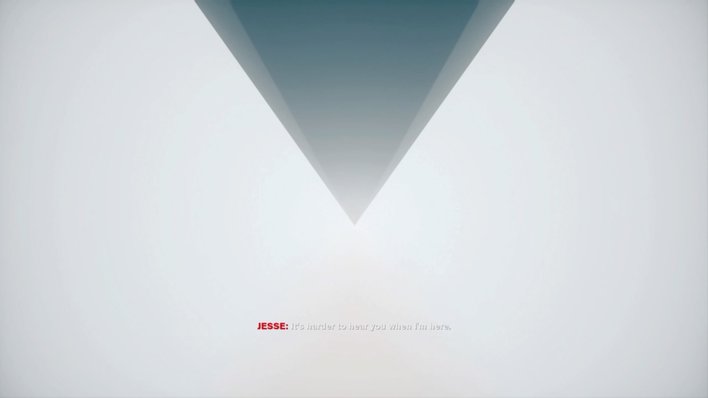
Special shout out to whoever thought white on white was a good idea for subtitles, too.

Whacking this across the screen mid-combat doesn't seem like the best of ideas in hindsight, either.
But despite the few things it gets wrong, Control is a game that you'll want to see through to the end - and one you'll keep coming back to until you do. When everything clicks, there are few games that can come close to how much fun this is to play - it's just a shame those little niggles let it down. With the story taking longer than it really should to get going, and the distinct lack of a great orchestral score like Alan Wake's to keep the action flowing, this isn't as good as Remedy's seminal Xbox 360 outing - but it is a game worth picking up in its own right.
Format Reviewed: Playstation 4

















